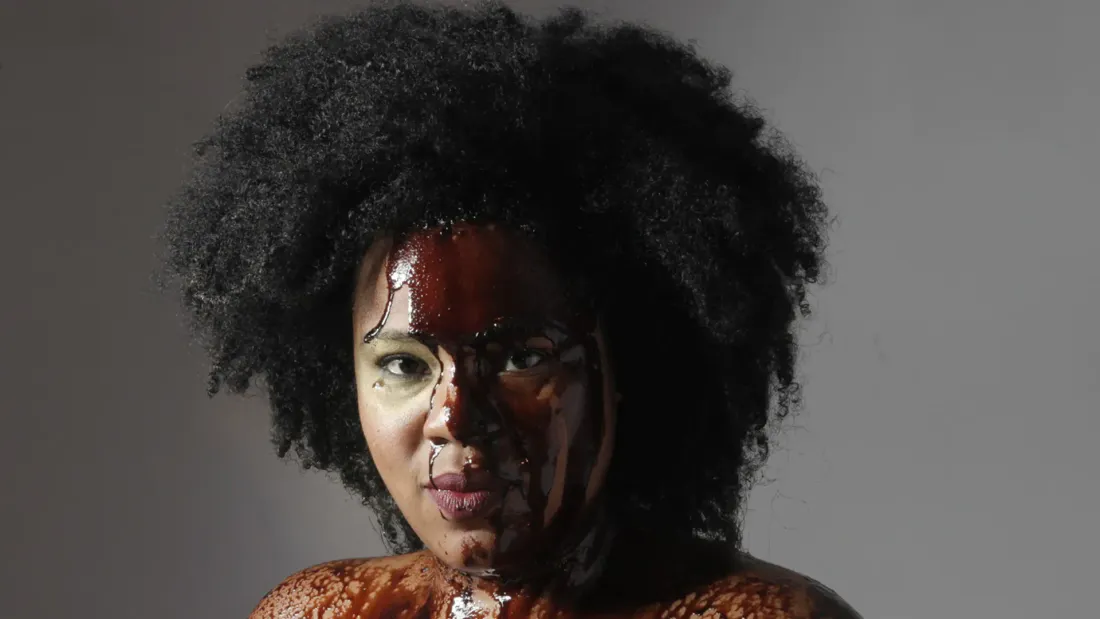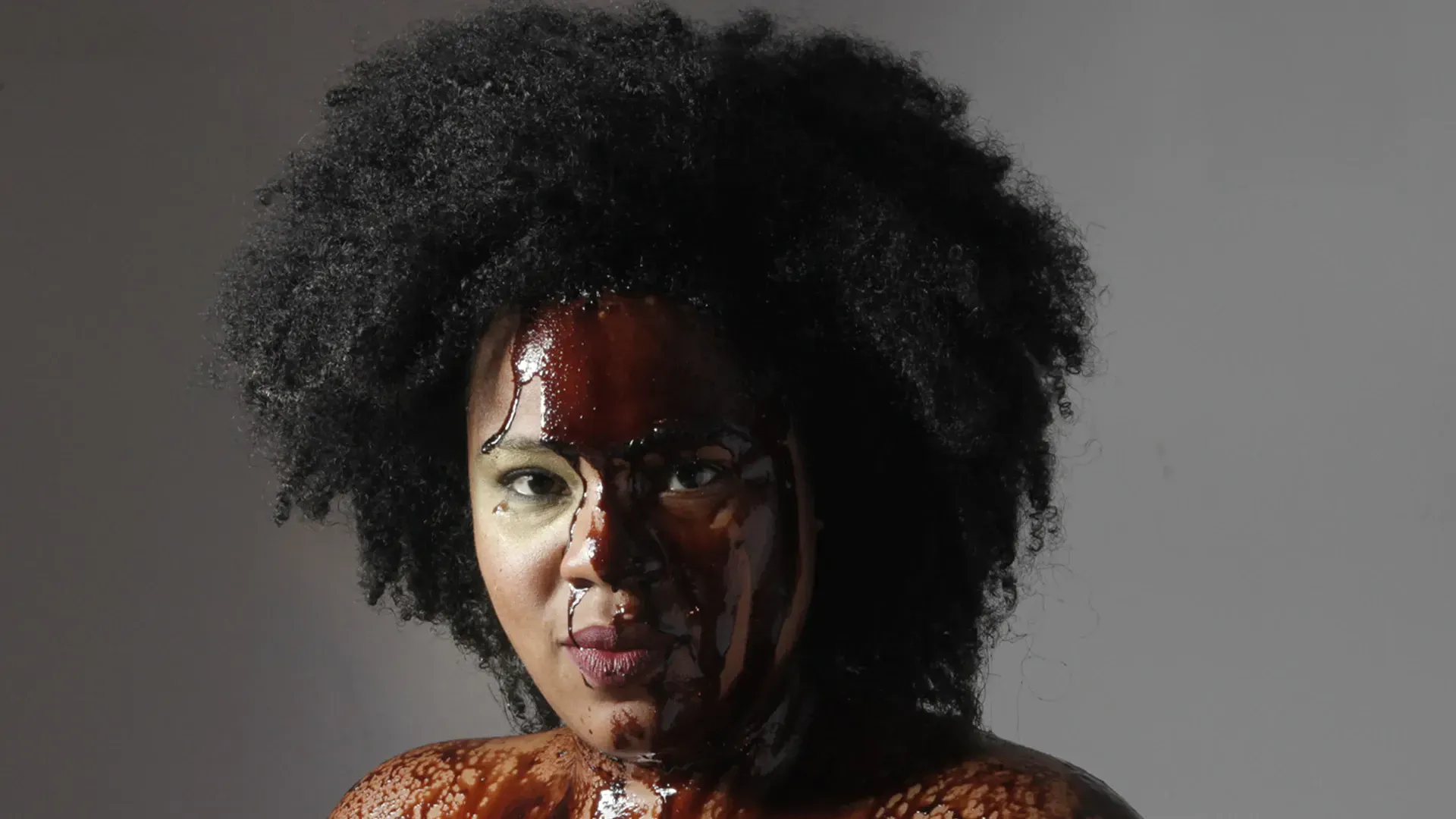A Sticky Story
Written by


Desiree Burch is a story weaver. She begins a braid and like every good weaver she keeps going with her story until it’s time to pull it tight with a bow. It’s a simple and powerful way of storytelling and across multiple time zones this talented playwright and performer caught up with Dione Joseph to weave together some of the important strands that bring Tar Baby to life.
Tar Baby weaves games, laughter and insight as Burch takes the audience through a participatory experience of carnival side shows illustrating her own experiences with race in America. Winning a 2015 Edinburgh Fringe First Award and shortlisted for the Amnesty International Freedom of Expression, this work is fresh off a UK tour.
“Part of the journey of creating this work has involved both decolonizing my own mind and also reflecting on how that has shaped my point of view. We all grow up in a racist world and when you’re a subject of that it makes you resentful but you’re also trying to distinguish yourself at all times,” she says.
“Whether it’s through respectability, politics or any other device, fundamentally you’re asking to be seen as a human being while simultaneously hating all these elements of your humanity that are culturally recognisable. At the end of the day no matter whether the world tells you you’re okay or worth it, you’re the only person who’s going to have to make that decision.”
It’s a stirring start to our conversation but Burch is quick to point out that she didn’t go into this to develop a commentary on race relations. As a storyteller she was inspired by the frame of the folktale narrative, not just for its persistence throughout history and across various different cultures, but also for its ability to be re-purposed.
“I create personal work because it’s just the nature of what I want to create and what I do well. I think that is one way to try and stay away from the polemic is to be intensely vulnerable and authentic in the work you do because it will inevitably be nuanced.”
“A work can’t ever really claim to espouse a whole belief system and it will be contradictory and the contradictory always smacks of truth because we understand that things are both themselves and their opposite at all times - and that things mean one thing and they mean another. It’s up to us to make decisions and also live with that ambiguity.”
Tar Baby isn’t the ghettoized story of ‘growing up in the hood’ and Burch is very conscious of the need to share a different but similar story of encountering racism in all its multifaceted guises.
“I grew up in white middle class suburbia when my dad was able to make enough to move out of central Los Angeles and it’s not like it gets better,” she says. "Just because a person does not experience that kind of openly condemnable trauma that doesn’t mean there aren’t other kinds that openly affect a person’s world view or esteem or even their direction in life. We’re just kids who get bigger and with those sorts of events it’s hard not to be crippled by them no matter how hard you work to earn it.”
The story of Brer Rabbit and the Tar Baby is a well-known folktale but the phrase has also been used as racial slur in the American south. Burch brings these narratives together but does so with the intention to explore not just the content but how a seemingly innocent story can be used over and over again at a social and global level to perpetuate myths of privilege and superiority.
“The tar baby characters have existed in different cultures in different contexts over several hundreds of years,” explains Burch.
“Just like racist narratives can be changed to apply to whoever - these caricatures can also be similarly constructed to make people believe that this is God’s honest truth but really it is simply a vehicle that you can pour so much into.”
Burch is also interested in politics not polemics. It’s easy to get caught up in the easy mechanics of pitting black against white but when you start unwrapping the layers of history there is a machinery at work, she argues, that is independent of the stench of racism that we associate with it.
“Consider the events of generations before us,” she says. “What lies at the source of dehumanizing and exploiting another human being? It comes down to the reality that one human being refuses to recognise another as equal and instead places a monetary value on their existence. That in turn created a value system that was passed on from one generation to the next. It essentially was a story that was sold to their children and children’s children who in turn believed that they were better than this other whole grown human being because that ‘thing’ was simply not human.”
This self-confessed revelation is a central part of the work but it also was intrinsic to Burch’s personal journey to go beyond her own feelings, of both hurt and affront, and therein lies the power of her story and her work. It’s a trope that has played out across the world to devastating and ongoing effects yet if the work is reflective of Burch’s personality then it will certainly be laced with wit and humour.
Expect Desiree Burch’s work to be powerful, poignant and purposeful – but whatever you do don’t expect to be spoon-fed on racial politics, this will be one show where you are guaranteed to walk away knowing that the show and the conversation will continue long after the lights come up and claps die down.
Desiree Burch is a NY-to-London transplant. She is also a writer, performance artist, actress and comedian, best known for her full-length solo shows, 52 Man Pickup and Tar Baby, which have toured internationally. Her most recent solo show, Tar Baby was awarded a 2015 Fringe First Award for new writing at the Edinburgh Festival Fringe, where it was also shortlisted for the Amnesty International Freedom of Expression Award. She is the winner of the 2015 Funny Women Stage Award for stand-up and a performer in the hit podcast, Welcome to Night Vale. She is a recipient of the Franklin Furnace Fund, a New York Neo-Futurist, an arts educator and public speaker (TEDx, NerdCon: Stories) and a graduate of Yale University.
Making her New Zealand debut, Huffington Post ‘Favourite Female Comedian’, Desiree Burch, challenges the notion of a post-racial America in this interactive carnival of race and capitalism.
With a socially conscious comedic style reminiscent of Richard Pryor and Louis CK, Burch uses stand-up, current events and autobiography to speak to America’s growing majority of minority experiences.
Tar Baby takes a funny and inclusive look at the scary and divisive subject of race.
- Tar Baby is on March 3-4 and 6 at Spiegeltent, Aotea Square, at Auckland Arts Festival 2016